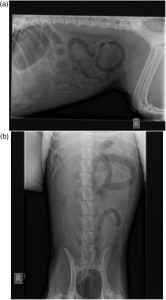An article recently published in Veterinary Record Case Reports describes a case of small intestinal segmental volvulus in a dog secondary to dietary obstruction. Small intestinal volvulus is an infrequently encountered condition in small animal practice. Within the published literature, there are notable contrasts in the clinical history and examination findings described as well as the success of the surgical intervention itself. This cases serves to propose both a cause for the volvulus and also describe its successful management.
The case describes a four-year-old golden retriever that had been vomiting intermittently and had been lethargic for a few days. The owners described the diet which the dog was being fed as consisting of a chicken bones and raw food (BARF) diet along with boiled potatoes and pasta. There was no history of foreign bodies having been consumed.
On clinical examination, there was an area of mid-abdominal intestinal thickening within the abdomen, but no discrete foreign body was palpated. Biochemistry, electrolyte and haematology blood samples were unremarkable, while abdominal radiographs were consistent with an intestinal foreign body (Fig 1).
At exploratory coeliotomy, segmental small intestinal volvulus was identified, and successfully excised by enterectomy without previous derotation. The patient made a smooth recovery from anaesthesia and surgery. Upon dissection of the excised portion of intestine, bones that were anatomically typical of those contained in chicken legs were found.
BARF diets have been recently increasing in popularity among dog owners. This is not currently mirrored by the profession where the vast majority are still cautious on their use especially in regard to the food hygiene and nutritional imbalance risks. This having been said, there are increasing numbers of the profession now considering whether BARF diets can be used in dogs, and if so how they can be nutritionally balanced.
This case demonstrates that intestinal volvulus, which is often considered to have an acute onset, may have a more delayed presentation, and still be successfully surgically managed. Additionally, it demonstrates that intestinal obstruction with secondary volvulus can occur due to dietary obstruction when a dog is fed a BARF diet.
More details, images and discussion about this case can be found here
